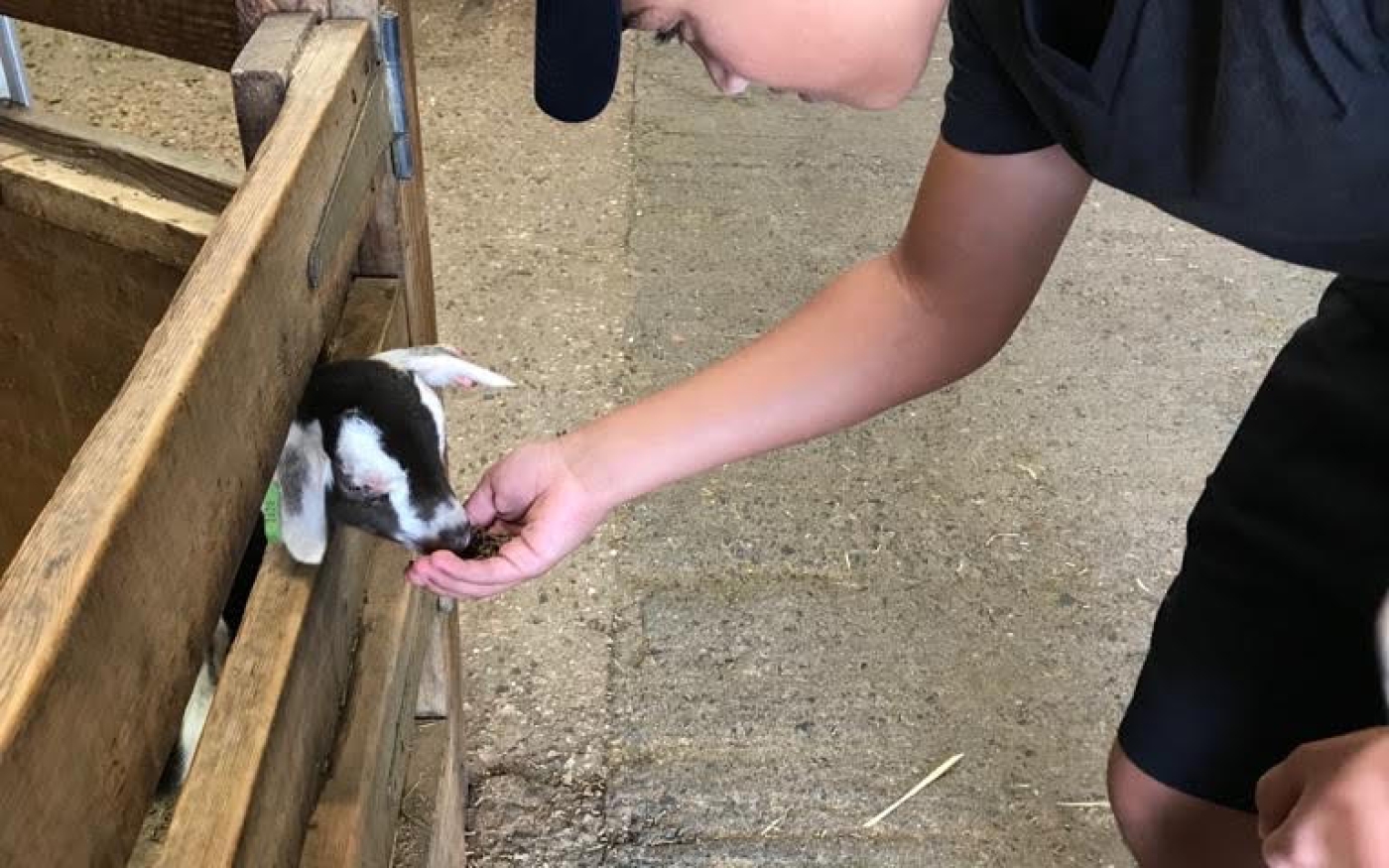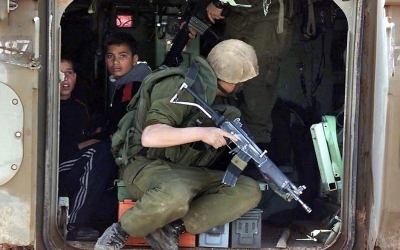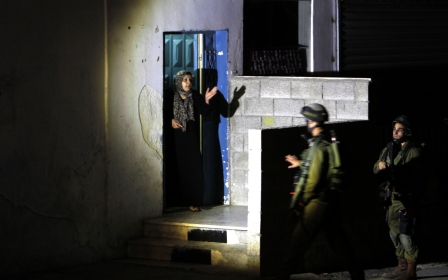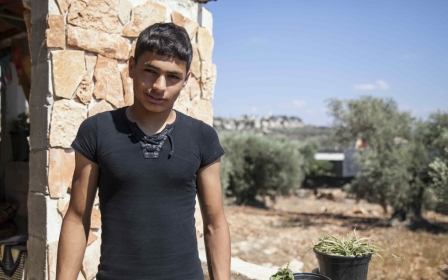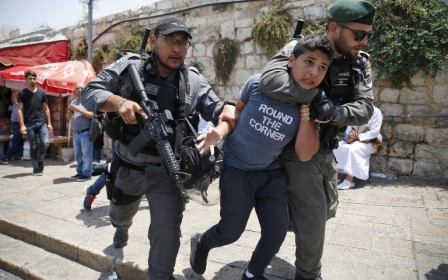My teenage nephew was beaten by Israeli forces - sadly, this is not an isolated case
My nephew, Akram Obaid, is a 16-year-old who lives in occupied East Jerusalem. He was interrogated twice by Israeli intelligence officials and was, on the second occasion, left with a minor head injury after being beaten. The interrogator took his phone with the password and kept it until now.
It is no consolation to him that he is by no means exceptional; such assaults intend to “teach” young Palestinians to unquestioningly obey authority. Like other Palestinian teenagers who live in Jerusalem, Akram knows he can be stopped, checked, attacked or even killed by Israeli soldiers at any time.
On both occasions of his detention, the Israeli interrogator rang his father and asked him to bring Akram in for questioning at 8am. When his father explained that Akram had to go to school and take exams, the interrogator said this was not his problem. No Palestinian from the occupied West Bank will be surprised by this. After all, this is the official Israeli mindset writ large: we command, and you obey.
I also wonder what kind of delusion, or even sickness, has seized someone's mind when they see fit to speak about hatred while inflicting violence on a child
Akram’s father was not allowed to support his son during the interrogation. In other, more civilised, contexts, this would be a legal requirement - but not in occupied Palestine. Israeli officials treat security as some sort of holy writ that trumps all other moral or legal considerations.
On the first occasion, Akram was interrogated about a TikTok video that showed him and his friends ridiculing Israeli soldiers. In the second interrogation, he was asked about another, similar TikTok video.
He was then beaten up, with interrogators deliberately targeting his head and neck. But this was not sufficient for them, as he was told to say his name was “son of a whore”. When he refused, he was struck and beaten. He was badly shaken by the experience and, after the Israeli interrogators had finished with him, he was admitted to hospital and diagnosed with a minor head injury.
Jerusalem tensions
When Akram visited me in the UK, he did all the things that children should be able to do. In occupied East Jerusalem, however, he has to cross a checkpoint every day to go to school, where he sees Palestinians of all ages being humiliated and belittled by Israeli soldiers. He has to live in an uncertain and frequently violent environment.
There is a lot of tension in the city at the moment because of Israel’s attempts to expel Palestinians in Sheikh Jarrah from their homes and give them to settlers. Israeli police have also stormed al-Aqsa Mosque on multiple recent occasions.
But it apparently does not occur to Israelis that Palestinians have every right to resist these and other intrusions on their fundamental rights. Indeed, they do not just have the right, but they are obliged - by basic human dignity and self-respect - to resist.
This certainly did not occur to the interrogator who asked Akram why he hated Jews. Of course, this in itself was a prejudice. In very different circumstances, Akram would perhaps be able to ask the interrogator why so many Israelis, including those who have marched through the streets wishing death to Arabs, hate him.
Indeed, this hatred is so pervasive that it extends to a form of internal racism, in which Jews who used to live in Arab countries are viewed as inherently inferior to their Europeanised counterparts. David Ben-Gurion, Israel’s first prime minister, claimed that Arab Jews lacked “the most elementary knowledge” and were “without a trace of Jewish or human education”.
Moshe Sharett, in his role as foreign minister, said “we cannot count on the Jews of Morocco to build the country, because they have not been educated for this”. And Zeev Jabotinsky, a major political influence on the Israeli right, effectively denied the very existence of Mizrahi Jews when he said that “Jews, thank God, have nothing in common with the East”.
Militarism and suspicion
I would like to ask the interrogator where this hatred comes from. How did these people come to believe that Arabs are inherently backwards, primitive, hostile and cruel? And how did he come to believe that all Arabs hate Jews?
But these would, of course, be rhetorical questions, as we already know the answers: an education system that teaches children to view Arabs as inherently inferior, a political system constructed on inherited racism and a colonial legacy, and an associated political ideology that instils militarism and suspicion of the outside world.
I also wonder what kind of delusion, or even sickness, has seized someone’s mind when they see fit to speak about hatred while inflicting violence on a child - or when they fail to question the fact that they are part of a racist, colonial structure that views Palestinians as inherently inferior, deserving to be belittled, humiliated, dehumanised and even killed.
Palestinians in Gaza, the occupied West Bank and East Jerusalem, and inside Israel, in addition to Palestinian refugees, are thus confronted by a system that does not just deny their fundamental rights, but also their very right to exist.
Indeed, the Israeli interrogator was only able to do what he did because he viewed Akram as inferior and deserving of no more than violence and humiliation. History teaches us - and I would expect Israeli Jews, of all people, to be aware of this - that dehumanisation is not just a precursor to, but an essential precondition for, the most grotesque and inhuman of crimes.
In reflecting on Israel’s crimes, we perhaps make the mistake of focusing only on those that inflict the most damage or take the most lives. We scale up, and focus on things in their largest perspective. Perhaps we should instead consider them in their infinitesimal proportions, and ask where inflicting head injuries on a child or forcing him to insult his own mother will ultimately take us.
The views expressed in this article belong to the author and do not necessarily reflect the editorial policy of Middle East Eye.
Middle East Eye propose une couverture et une analyse indépendantes et incomparables du Moyen-Orient, de l’Afrique du Nord et d’autres régions du monde. Pour en savoir plus sur la reprise de ce contenu et les frais qui s’appliquent, veuillez remplir ce formulaire [en anglais]. Pour en savoir plus sur MEE, cliquez ici [en anglais].



